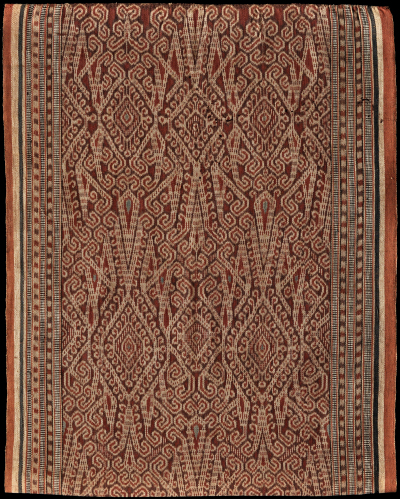| |
220 Borneo, Sarawak
Kain kebat (skirt)  
|
| Locale: | Baleh river area |
| Period: | Early 20th c. |
| Yarn: | Cotton, hand-spun, medium |
| Technique: | Warp ikat |
| Panels: | 1 |
| Size: | 46 x 58 cm (1' 6" x 1' 10") LW: 1.26 |
| Weight: | 155 g (5.5 oz), 290 g/m2 (0.95 oz/ft2) |
| Design: | Most probably depictions of spiders, with centipedes as fillers. Field constructed out of four identical longitudinal sections, ordered LR-RL-LR-RL. Tiny accents in a light indigo enhance the visual attractiveness and create additional depth. |
| Comment: | Fine old kain kebat with intricate patterning, using indigo, morinda and morinda lightly overdyed with indigo to produce subtle line shading in part, to bring out the motifs. The work of a master weaver. The absence of commercial yarn and chemical dyes in the border point to provenance some way into the interior, Baleh being the most likely given the cognate described by Heppell (see below). A tiny hole about 4 mm in diameter on the rear side when displayed as on the photo; some minuscule dark traces which under microscope appear to be pure indigo. Apart from these minor blemishes in excellent condition, with saturated colours. |
| Background: | Chapters on Borneo and Sarawak. |
| Published: | Ikat Textiles of the Indonesian Archipelago, 2018.
|
| Compare: | 212 229 242 300 243 |
| Sources: | Very similar to Baleh kain kebat in Heppell, The Seductive Warp Thread, Fig. 128. Similar to early 20th C. Iban kain kebat in MFA Boston Nr. 1982.238. Also similar to Iban kain kebat in Haddon and Start, Iban or Sea Dayak Fabrics and their Patterns, Plate 35.865. The authors mention the use of overdying on their example as well. A significant difference is that in our example the borders were done in natural dyes. Identification of motifs based on Plate XIV, XV, XVI. Similar to Schefold, Alpert c.s. Eyes of the Ancestors. Fig. 43. Below, a 1950 Sarawak stamp showing cloth like this in use.
 |
| |

©Peter ten Hoopen, 2025
All rights reserved.
|


